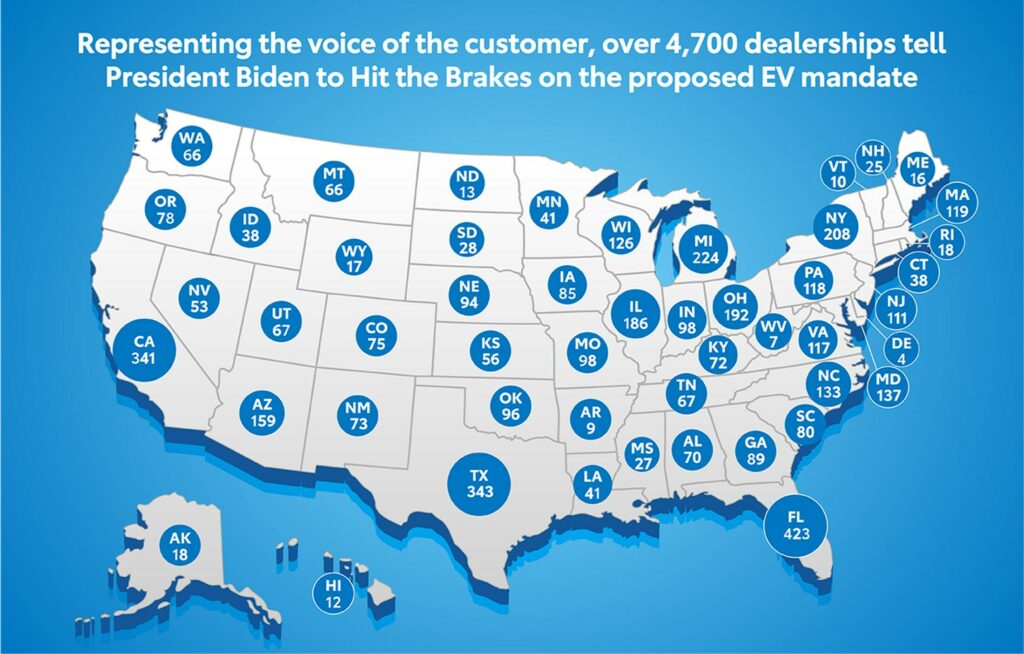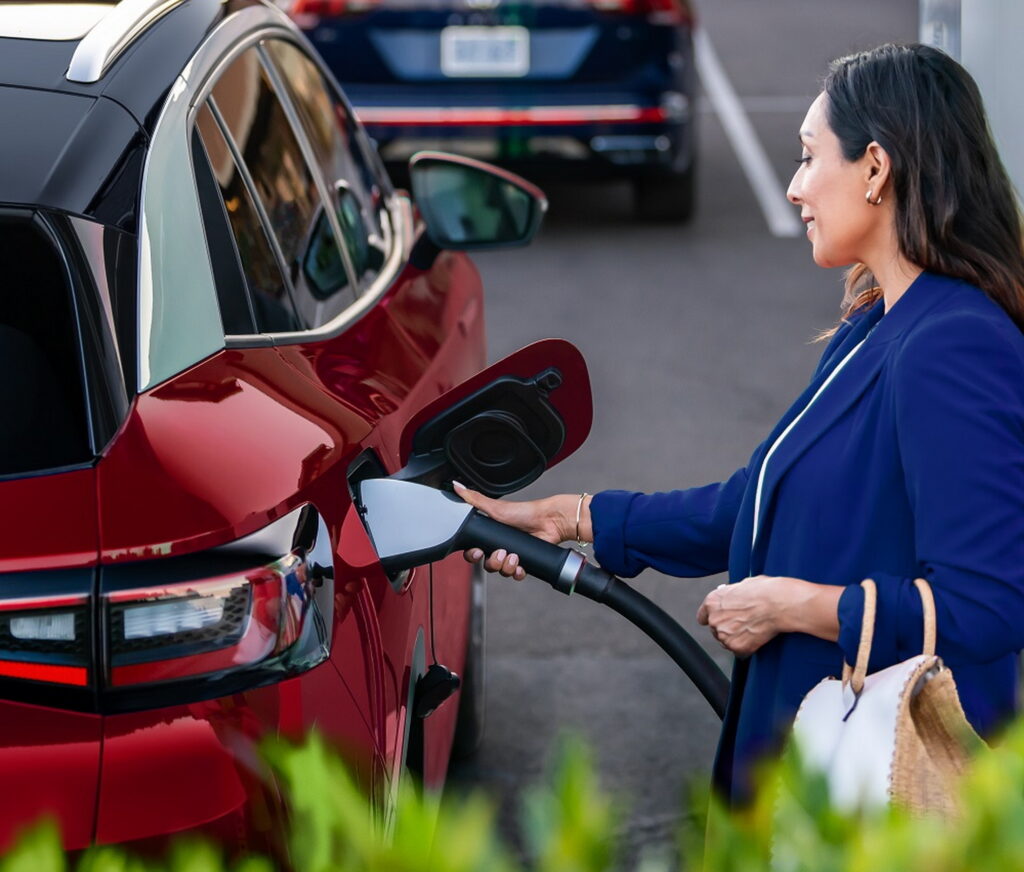A significant coalition of U.S. dealers is making their voices heard once again with their second letter to President Joe Biden in just two months. This time, approximately 4,700 dealerships spanning all 50 states are urging the President to “hit the brakes” on the proposed Electric Vehicle Mandate, asserting that “the infrastructure isn’t prepared” for a fully electric future
The first letter from November 2023, which was signed by 3,882 dealerships, went unanswered by Biden and his administration. In response, a larger group of dealers has now voiced their opposition to the proposed Electric Vehicle Mandate, which they describe as ‘completely unrealistic’.
Their primary concern centers around the EPA’s proposed vehicle emissions standards for the 2027-2032 model year cars and light trucks, set to be officially confirmed in March 2024. This proposal targets a 60% market share for new battery electric vehicle sales in the U.S. by the 2030 model year, with an additional increase to 67% by 2032.
In contrast to other regions, such as Europe, where legislation is poised to effectively prohibit the sale of new gas- and diesel-powered vehicles beginning in 2035, this approach is seen as less stringent.
The Key Points Among BEV Critics

The latest letter, signed by nearly 5,000 dealers, highlights several ongoing concerns regarding electric vehicle (EV) ownership. They critique the high cost of EVs, noting that many are currently ineligible for tax credits. Additionally, they express reservations about the limited practicality of EVs in cold-weather conditions and describe the public charging network as ‘woefully inadequate’ for those unable to charge at home. Lastly, the dealers propose waiting for the battery supply chain to mature beyond China’s control before fully embracing an EV futuure.
The coalition is led by Mickey Anderson, the CEO of Baxter Auto Group, encompassing 20 dealerships representing Ford, Honda, Toyota, and VW brands across Nebraska, Kansas, and Colorado. Speaking to Auto News, Anderson stated, “The unfortunate aspect of this situation is that if manufacturers had the freedom to produce the vehicles that align with current customer preferences, we would witness a much higher demand for plug-in EVs and hybrids”.
In a similar vein, the National Automobile Dealers Association (NADA) has voiced criticism of the EPA’s proposal, stating that it’s progressing ‘too quickly, too soon.’ Jonathan Collegio, NADA’s Senior Vice President of Public Affairs, emphasized the need for regulators to adopt a “more practical and consumer-friendly approach to the adoption of EVs”.
More: EPA Sends Latest Emissions Cuts Proposal To White House

In response to the criticism, a spokesperson from the White House issued the following statement to Automotive News: “Every day, more Americans are choosing EVs, and EV sales are outpacing traditional gas-powered cars. This trend is aided by the President’s Inflation Reduction Act, which not only makes EVs more affordable but also enables Americans to save money while driving.”
Meanwhile, an EPA spokesperson declined to provide further comments on the draft rule, citing its ongoing review.
You can read the full letter below or at the official website set up by the supporting dealerships here.
A New Letter from Auto Dealers to the President
Dear Mr. President,
In November of last year, over 4,000 auto dealers from across the country representing every major automotive brand wrote you a letter asking that you “tap the brakes” on a proposed government electric vehicle mandate. The letter reflected the voice of our customers – the Americans who come to our dealerships every day to buy vehicles that are affordable and meet their needs.
There has been no response to the letter from your Administration.
In the next 8-10 weeks, the proposed regulations are expected to be finalized. As you consider whether to force American consumers to buy electric vehicles at unprecedented levels, we ask that you consider some facts:
The number of electric vehicles that qualify for the $7,500 tax credit in 2024 is less than half the number that qualified in 2023 (only 19 versus 43 last year). New rules disqualify vehicles that rely heavily on components and minerals from China, which currently dominates the supply chain for batteries. The cost premium for electric vehicles is a major factor for consumers, and the loss of these credits is bound to depress consumer demand in 2024 and beyond.
Despite the $7.5 billion allocated two years ago to build public electric vehicle charging stations, just three have been opened to date. Range anxiety is a major factor in consumers’ reluctance to buy electric vehicles. Based on the government’s estimates, 2.8 million public chargers will be needed by 2032, but only 170,000 public chargers exist today. That means 800 new chargers would have to be built every single day — for the next nine years. Clearly, this is not even in the realm of possibility.
Electric vehicles represented just 8% of vehicles sold in 2023. The proposed regulations would require that 60% of vehicles sold in 2030 be battery electric – and two out of every three by 2032. Electric vehicle sales are not remotely on trend to meet those requirements. Indeed, the day supply of electric vehicles on dealer lots today is nearly twice the supply of conventional vehicles.
Mr. President, our letter in November asked that you tap the brakes on the electric vehicle mandate. We now ask that you hit the brakes. It is uncontestable that the combination of fewer tax incentives, a woefully inadequate charging infrastructure, and insufficient consumer demand makes the proposed electric vehicle mandate completely unrealistic.
On behalf of our customers, we ask that you pause on the electric vehicle mandate. Wait for the battery supply chain to develop outside the control of China. Wait for the charging infrastructure to support a significant increase in electric vehicles. And wait for the American consumer to make the choice to buy an electric vehicle, confident that they are affordable and won’t strand them because of a lack of charging stations.
Mr. President, we share your belief in an electric vehicle future. We only ask that you not accelerate into that future before the road is ready.
Sincerely,
Supporting Dealerships




